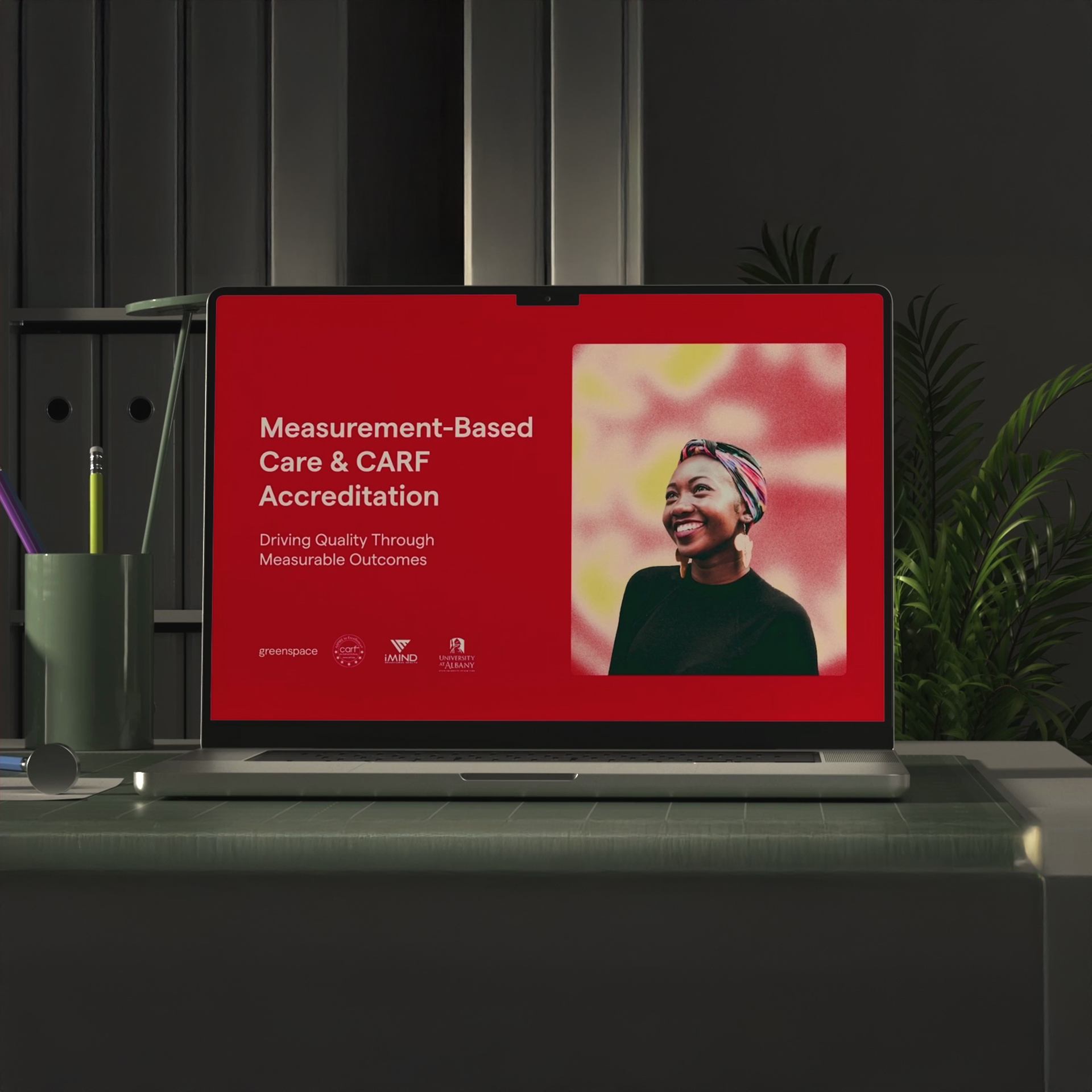
Measurement-Based Care (MBC) is a patient-centered approach to behavioral health treatment that leverages symptom data collected from clients to monitor and tailor care to their individual needs. The data collected through MBC can include patient-reported outcome measures (PROMS), measures of symptoms, functioning, and more. The process of MBC includes selecting appropriate measures, determining how often to assess, introducing the rationale for MBC to clients, and creating a collaborative environment where clients can actively participate in their treatment.
Despite the evidence supporting the use and effectiveness of MBC, it’s only recently started to gain traction amongst behavioral health practitioners and organizations. The practice of MBC is flexible and can be applied across all types of clinical settings, populations, and treatment modalities— but it can be challenging for clinical leaders to know exactly how to approach it within their unique treatment settings. In the article, The Need for a Measurement-Based Care Professional Practice Guideline, James Boswell and his colleagues (including our friend from the Yale MBC Collaborative, Amber Childs) make the case for the development of a Professional Practice Guideline (PPG).
What are Profession Practice Guidelines (PPGs)?
PPGs serve to guide psychologists in practice and provide a resource for professional behaviour. They’re not intended to restrict professional judgment, but instead are meant to promote a high-level of practice and serve as an educational tool, which can inform application of process across roles, populations, and various settings.
The American Psychological Association (APA) has approved a variety of clinical and professional practice guidelines to support psychologists in the United States. The authors believe a PPG will play a crucial role in driving the adoption of MBC through improved research, implementation guidelines, and strategies to support patients, providers, and health systems overcome perceived barriers.
Demonstrated Need for a Measurement-Based Care (MBC) PPG
According to APA’s policy from 2015, PPGs should only be developed when there is an identifiable need in three core areas:
(1) public benefit,
(2) professional guidance,
(3) legal and regulatory issues.
The article suggests an initial draft of a PPG statement, which outlines how it will help with evidence-based service delivery, in order to drive improved outcomes, lower dropout rates, and increased client satisfaction.
The PPG will also help better align payment models with the treatment goals of patients and therapists, as well as continue advocacy for research as the proliferation of MBC across all different types of service modalities continues to grow.
Here’s a brief summary of each core area outlined within the article:
1. Public Benefit
The benefits of MBC have been widely recognized, having a positive impact on both service providers and users. An MBC PPG will not only assist and encourage more providers and organizations to adopt MBC, but it will also promote equitable care for diverse patient populations.
a. Improved Service Delivery
In addition to improving client retention, clinical outcomes, and client satisfaction, MBC impacts people in care, providers, and organizations in many others ways:
- Patients’ Rights: MBC offers clients increased agency in their care process, by opening the door for improved collaboration, communication, and decision making. Clients should have the ability to evaluate care options and make a decision knowing their treatment goals and how progress will be measured during treatment.
- Individual-Level Benefit: MBC supports the provision of person-centered, collaborative care by ensuring the client feels empowered to be an active partner in their recovery, and that their voice is at the centre of the care process. Clients completing self-assessments have the opportunity to better understand themselves and their mental health needs, be more engaged in treatment, and build resiliency they can carry outside of care.
- Provider-Level Benefits: MBC helps providers easily identify when clients may be off-track earlier than they would be able to without objective outcome data. That said, MBC is not meant to replace the knowledge, skill, and training of the therapist or psychologist— it is simply a valuable, objective tool for them to use to gather a deeper understanding of their clients and inform their clinical decisions.
- Organization/System-Level Benefits: MBC supports Value-Based Care payment models by empowering payors to compensate clinicians for practices that are proven to improve outcomes and lower the overall cost of care. MBC is a standardized requirement for accreditation by the Joint Commission. With consistent data on the effectiveness of their services, organization have the insights they need to make evidence-based decisions about programming and quality improvements, so they can offer high-quality, person-centered care to their communities.
b. Emerging, Underserved, or Vulnerable Patient Populations
The article acknowledges that MBC can be received differently in culturally diverse settings. Factors like client literacy, availability of measures in different languages, and cultural identity, may influence provider and client perceptions of MBC. An MBC PPG is necessary to ensure that there are guidelines to support MBC implementations in diverse communities, while eliminating barriers to evidence-based practices that could improve the quality of care available.
2. Professional Guidance
Despite the vast body of research and theory surrounding MBC, misconceptions remain among providers. For instance, many providers believe that MBC is not well perceived by clients, when really they almost always have a positive opinion of it. Not only this, but its shown to increase client engagement (Greenspace MBC assessment completion is usually well above 80%), improve outcomes, and reduce dropout rates. There is an identified need for ongoing provider training and education on the data and theory behind MBC in practice— something that would be provided by the development of an MBC PPG.
3. Legal and Regulatory Issues
Recent changes to regulation and legislation in the mental health space have made measuring outcomes a priority for many organizations. New reimbursement models like Value-Based Care programs, and Certified Community Behavioral Health Center (CCBHC) qualifications are all driving factors behind the growing adoption of MBC across the United States.
A PPG could help ensure that the measures used to identify quality of care are aligned with those that matter to providers and clients in care. By promoting MBC education, providers will have the skills to effectively implement measurement and, in turn, will encourage alignment with payors as to what measures should be used when monitoring quality of care. By using the same MBC measurement and reporting systems across various settings, clients, providers, and health systems will benefit from an integrated and cohesive approach to care focused on quality improvement and innovation.
Final thoughts
As MBC adoption continues to accelerate, the need for educational resources and training is a necessity to ensure clinicians and organizations have the tools they need to confidently implement MBC. The development of a PPG would be a step in the right direction; it will spark more research in the field, provide useful guidelines for implementation, and enable the successful application of MBC with diverse cultural populations. To learn more on the topic or see the drafted PPG developed by the authors, you can read the full article here.
If you’re interested in learning more about MBC and implementation across any type of setting, visit greenspacehealth.com to schedule a call with one of our implementation experts.












